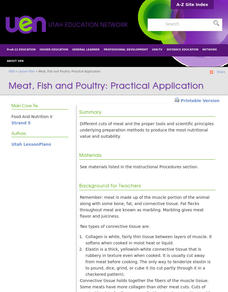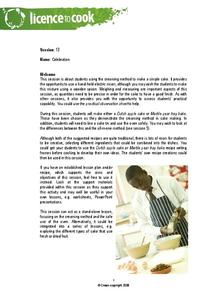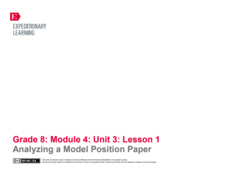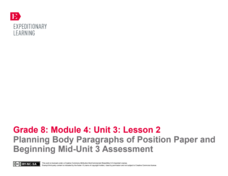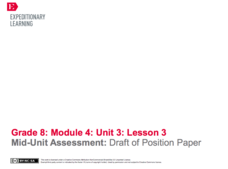Curated OER
Macromolecule Lab
During a macromolecule lab, young chemists perform multiple tests, including iodine starch tests, to determine if eight mystery foods contain lipids, sugars, or starches.
Polar Trec
Bioaccumulation of Toxins
In 2015, Peter Cook found that sea lions with high levels of exposure to toxins suffered permanent brain damage if they survived at all. Scholars learn about the accumulation of toxins at various levels of the food chain. Using...
Curated OER
Black Tiger Academy Martial Arts Fitness Unit – Lesson 10
“To succeed, we must first believe that we can.”—Michael Korda. Black Tiger Academy’s martial arts instructional activity 10 of 20 continues discussing nutrition focusing on serving size. Americans overeat which leads to many health...
Nemours KidsHealth
School Lunch: Grades 9-12
Go! Slow! Whoa! As part of a study of the nutritional value of foods available on the school campus, groups label those that are fine anytime as "Go" foods. Those that are okay a few times a week get the "Slow" label while those...
Curated OER
Meat, Fish and Poultry: Practical Application
A note-taking outline is given to learners which covers meat composition and quality, types of meat and storage, and cooking meat. By viewing pictures they learn to identify cuts of meat or poultry products. They discuss inspection and...
Curated OER
Let's Have a Fiesta!
First graders plan a Mexican fiesta, create a paper flower and cook a tortilla to eat with a fruit drink. They listen to Gary Soto's, Too Many Tamales and June Behrens', Fiesta! Cinco de Mayo.
Nemours KidsHealth
School Lunch: Grades 3-5
Two lessons encourage scholars to make smart food choices. Lesson one challenges participants to create a five-day meal plan. In lesson two, learners pack an imaginary lunch, drawing pictures on a printable lunch bag divided into food...
Food a Fact of Life
Back to Basics
Ratatouille, the sauce not the animated Disney film, is the focus of this foods lesson. Class groups prepare either a classic tomato ragu or a ratatouille to take home and share with their families.
Food a Fact of Life
Pasta Mania
The timing of preparing a roux sauce to accompany either a tuna and broccoli pasta bake or macaroni and cheese is the challenge young cooks face in this foods lesson.
Food a Fact of Life
Celebration
Mastering the creaming method in cake making is featured in a foods activity that asks class members to prepare a Dutch apple cake or a marble pear tray bake. A delicious way to celebrate.
Curated OER
Plankton in the Air
Here is a lab activity adequate for use with any full lesson on environmental factors that shape animal adaptations or marine animal characteristics. Pupils will discuss the role plankton plays in the environment and filter-feeding...
EngageNY
Creating a Visual Component for the Speech: End of Unit Assessment Preparation and Practice
Eye contact, volume, pronunciation. Working with partners, scholars practice presenting their speeches about the best food chain. Additionally, they choose a visual component to support their end-of-unit speech.
EngageNY
Analyzing a Model Position Paper
What's the difference between a position speech and a position paper? Scholars use a rubric to analyze a model essay about Michael Pollan's food chains to understand what makes them unique. Additionally, pupils create anchor charts...
EngageNY
Planning Body Paragraphs of Position Paper and Beginning Mid-Unit 3 Assessment
The best sandwiches aren't always edible. Pupils use a Quote Sandwich graphic organizer to plan paragraphs two and three of their position papers about the best food chain. Next, they begin drafting their body paragraphs for the mid-unit...
EngageNY
Mid-Unit Assessment: Draft of Position Paper
What is the purpose of an introduction and conclusion? Using the resource, scholars review the model position paper from activity one and discuss the author's choices. Next, they draft their position papers' introductory and concluding...
EngageNY
End of Unit Assessment: Final Position Paper
All good essays must come to an end. Pupils write the final drafts of their position papers about the best food chain from Michael Pollan's The Omnivore's Dilemma. Next, they share their favorite part of their papers with their partners.
EngageNY
Introducing the Performance Task Prompt and Beginning a Visual Representation
What exactly is a visual representation? Scholars use a think-pair-share to answer questions and record their information on anchor charts. Next, they use what they've learned to create visual representations of their position papers on...
NOAA
The Sea with No Shores
Some habitats are more bio-diverse than others. Scholars examine an especially diverse environment as groups research different species in a specific ocean habitat. The class then uses their research to create three-dimensional bulletin...
National Wildlife Federation
What's Your Habitat?
How do human habitats compare to animal habitats? Individuals begin their nature discovery by drawing their own habitats that extend beyond their houses. Pupils ensure their drawings include the four habitat elements of food, water,...
National WWII Museum
Rationing by the Numbers: Quantitative Data as Evidence
What was it like to live on wartime rations in the United States during World War II? Young historians find out by exploring how those on the home front bought food thanks to the ration system. Other data includes statistics on car sales...
Pace University
Grades 6-8 Ecology
Why are our national parks important? Scholars research the national parks and explore the basic ecology of these areas in a differentiated instruction unit on ecology. They learn about ecosystems, food chains, symbiosis, and biomes. The...
Alabama Wildlife Federation
Butterfly Gardening
Build a place for butterflies to call home. After identifying the needs of butterflies in terms of water, food, shelter, and reproduction, learners create a scale model of their ideal butterfly garden. Once the model is complete, they...
Curated OER
Blast the Fats
Students examine the fats found in foods. In this nutrition lesson, students identify the types and amounts of fats found in foods as they research food labels and the Internet. Students classify the fats and record their data.
Curated OER
Are You What You Eat?
Students observe what happens to the pigment of the Manduca when food coloring is added to their diet. They discuss how coloration affects their lifestyle. They answer questions to complete the lesson.
Other popular searches
- Food Pyramid
- Food Chains
- Food Groups
- Food Webs
- Food Labels
- Food Safety
- Desert Food Chain
- Esl Lessons Food
- Animal Food Chain
- Deciduous Forest Food Chains
- Nutrition Labels
- Healthy Foods




